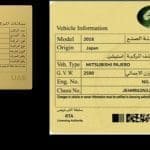
Rules for Buying an Old Car in Abu Dhabi
Rules for Buying an Old Car in Abu Dhabi
When it comes to buying an old car in Abu Dhabi, there are several essential rules you should follow to ensure that you make a smart purchase. Whether you’re buying from a dealer or a private seller, understanding the rules and regulations is crucial. With the right knowledge, you can avoid common mistakes and ensure that the car you purchase is both reliable and safe.
In this guide, we will walk you through the most important rules for buying an old car in Abu Dhabi. Whether you are looking for a budget-friendly used vehicle or a luxury model, following these steps will help you avoid legal complications and hidden costs.
Understand the Legal Requirements
Before buying an old car in Abu Dhabi, it’s important to understand the legal aspects of the transaction. In the UAE, every car sold must go through an official transfer process to ensure the ownership is properly recorded. This ensures that the car you are buying has no outstanding fines or legal issues.
- Car Registration Transfer
The first step in purchasing an old car is transferring the registration to your name. This requires the presence of both the buyer and the seller. The seller needs to provide a valid Emirates ID, along with the car’s registration card (Mulkiya). Without the transfer, the car’s legal ownership remains with the seller, which can lead to complications down the line. - Emissions Test
In Abu Dhabi, all vehicles, especially older ones, must pass an emissions test to ensure they meet the local environmental standards. If you’re buying an old car, make sure it has passed this test, as failing it can result in costly repairs or the inability to register the car. - Ownership Transfer Fees
When buying an old car, you will need to pay a transfer fee at the Department of Transport. These fees are relatively low, but they vary depending on the car’s value and the circumstances of the sale. Make sure to confirm this with the seller before proceeding with the transaction.
Do Your Research on the Vehicle’s Condition
When purchasing an old car, especially from a private seller, you must evaluate the vehicle’s condition. Even if the price is attractive, a car that’s not well-maintained can become a major headache. Here are some factors to consider:
- Mechanical Condition
It is essential to check the engine, transmission, and brakes of the vehicle. If you are not familiar with car mechanics, it’s advisable to take a trusted mechanic with you or hire an expert to inspect the car before making the purchase. - Vehicle History
Always ask for the car’s full history, including accidents, repairs, and past owners. This will give you insight into the car’s overall condition and any recurring issues that may affect its performance. The history report should also indicate if the car has any outstanding fines or debts. - Mileage
The mileage of an old car plays a major role in determining its value. A car with lower mileage is generally in better condition and will last longer. If the mileage seems unusually low for the car’s age, question whether the odometer has been tampered with.
Check the Car’s Insurance Status
In Abu Dhabi, all vehicles must have valid insurance coverage. Before buying an old car, ensure that it has an active insurance policy. If the car is not insured, you will need to arrange for insurance before driving it. This is crucial to avoid fines or penalties.
Insurance policies in the UAE are typically easy to transfer, but it’s important to check the specifics with the car’s current insurance provider. Ensure that the seller has not missed any premium payments and that there are no ongoing claims or disputes related to the car.
Vehicle Inspection and Testing
Old cars are more likely to have hidden issues, so it is always wise to get the car thoroughly inspected before finalizing the deal. In addition to the emission test mentioned earlier, there are other aspects of the car that require attention.
- RTA Car Inspection
For added security, you can arrange an RTA (Roads and Transport Authority) inspection, which will give you a full report on the car’s mechanical and safety status. The inspection will look for any signs of wear and tear that could affect the car’s performance. - Accident and Repair Check
Ensure that the vehicle has not been involved in any major accidents that could affect its structure or safety. Request a report from the seller about any past repairs, including engine or transmission work. - Exterior and Interior Condition
Check the exterior for any signs of rust, dents, or scratches. A well-maintained exterior is a good indicator that the car has been properly cared for. Similarly, inspect the interior for wear and tear, ensuring that everything from the seats to the dashboard is in good working order.
Be Wary of the Car’s Value
When buying an old car in Abu Dhabi, you should have an idea of what it’s worth. The price should reflect the car’s age, condition, and mileage. If the seller is asking for a price that seems too good to be true, it’s a red flag. Sometimes, the car may have hidden issues that will require expensive repairs later.
Use online car valuation tools or visit a trusted car dealership to get an estimate of the car’s value. Additionally, compare similar models in the market to determine if the price aligns with the car’s condition and specifications.
Understand the Warranty and Return Policy
Most old cars sold in Abu Dhabi are sold as-is, meaning the seller does not provide any warranty. However, some dealerships may offer limited warranties on used cars. If you’re purchasing from a dealership, ask about any warranty coverage and the terms of the agreement.
If you’re buying privately, be aware that return policies do not apply, and you’ll be responsible for any repairs after the sale. This is another reason why it’s important to get the car inspected before finalizing the transaction.
Avoid Paying in Cash
While cash payments are common in car transactions, it’s always safer to use bank transfers or secure payment methods. This leaves a clear trail of your purchase, which can be useful if there are any disputes later. Paying through a bank or a recognized payment method also adds a layer of protection, ensuring that the transaction is properly documented.
Finalizing the Sale
Once you’ve inspected the car, agreed on the price, and confirmed that all legal requirements are met, it’s time to finalize the sale. Ensure that all paperwork is in order, including the transfer of ownership documents, insurance papers, and the car’s registration card.
You should also request a receipt for the transaction, which includes the car’s details, agreed-upon price, and the signatures of both the buyer and seller. This document serves as proof of the sale.
In Abu Dhabi, it’s crucial to follow the rules and regulations when buying an old car to avoid future legal complications. Whether you are buying from a dealership or a private seller, always ensure that the car is in good condition, that all legal requirements are met, and that the price reflects the vehicle’s true value. By taking these steps, you can enjoy your new car with peace of mind.
Final Thoughts
Buying an old car in Abu Dhabi doesn’t have to be a stressful process if you follow the right procedures. By checking the vehicle’s condition, understanding the legal requirements, and conducting thorough inspections, you can make an informed decision. Be patient, do your research, and take the time to ensure that you are getting the best deal.
What documents are required when buying an old car in Abu Dhabi?
When buying an old car in Abu Dhabi, you will need several documents to complete the transaction. These include a valid Emirates ID, the car’s registration card (Mulkiya), and the seller’s ID. Additionally, both parties must be present to sign the ownership transfer forms at the Department of Transport. If the car is insured, proof of the insurance policy is also required.
How can I verify the car’s history before purchasing an old vehicle in Abu Dhabi?
To verify the history of an old car in Abu Dhabi, you should ask the seller for a detailed history report. This report should include information about any previous accidents, repairs, and past ownership. You can also request a certificate from the dealer or the seller, verifying that the car has no outstanding fines or debts.
Is it necessary to have a mechanic inspect the car before buying in Abu Dhabi?
Yes, it is highly recommended to have a mechanic inspect the car before buying an old vehicle in Abu Dhabi. A mechanic can check the car’s engine, transmission, brakes, and other important components to ensure that the car is in good condition. This helps prevent future repair costs and gives you a clearer picture of the car’s overall value.
What is the cost of transferring ownership of an old car in Abu Dhabi?
The cost of transferring ownership of an old car in Abu Dhabi depends on the value of the vehicle and the circumstances of the sale. On average, the transfer fee is low, but it’s important to confirm the exact cost with the Department of Transport. The fees usually include registration and administrative charges.
Can I buy an old car without an RTA inspection in Abu Dhabi?
No, an RTA inspection is mandatory for all vehicles in Abu Dhabi, including old cars. The car must pass the inspection to ensure it meets safety and emissions standards. Without passing the inspection, you cannot transfer ownership, and the car cannot be legally registered in your name.
Sell any car cash todayCheck our Blog posts for more tips related to buying, selling, or registering a used car in Abu Dhabi, dubai or any place in UAE.
Add a comment Cancel reply
Categories
- Abu Dhabi (2)
- Accidents (3)
- Car Registration (1)
- GCC Specs (3)
- Imported (3)
- Sell a car (1)
- Specs (1)
- Uncategorized (11,265)
Recent Posts
Related posts

Trusted Car Dealer in Bain Al Jesrain

Trusted Used Car Dealer in Bain Al Jesrain











